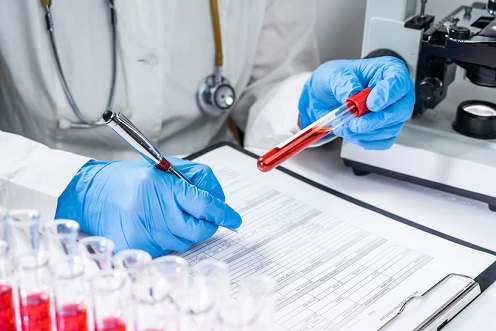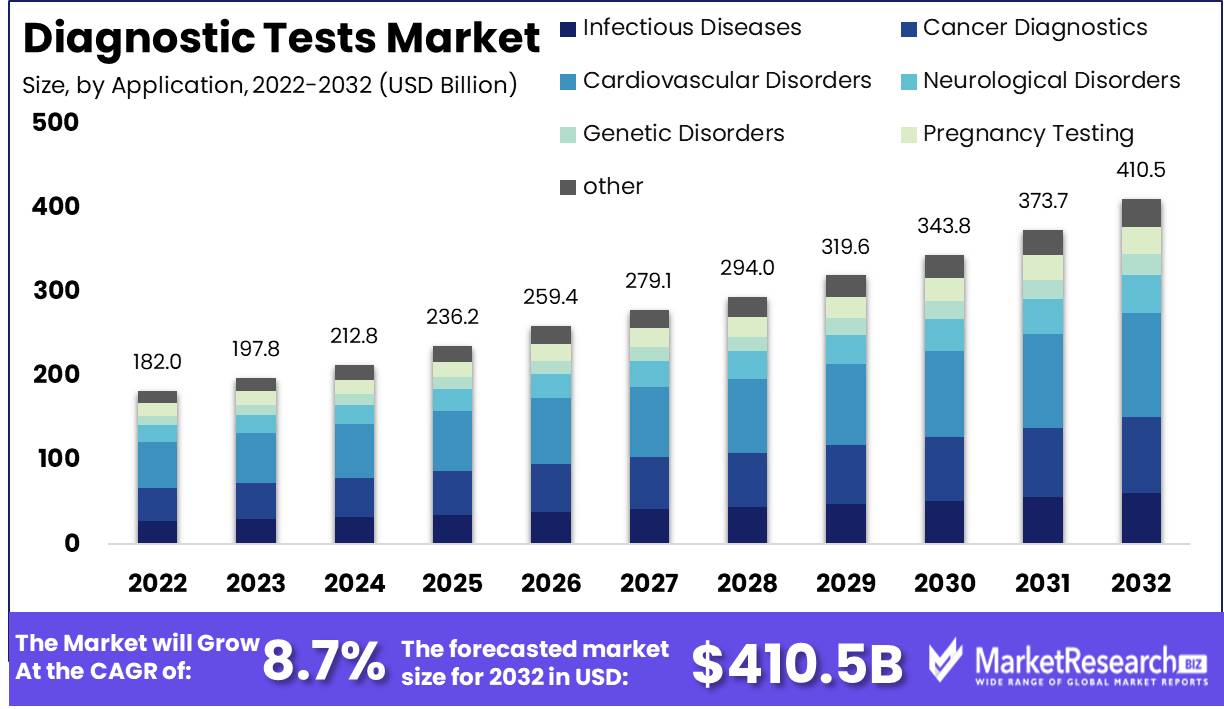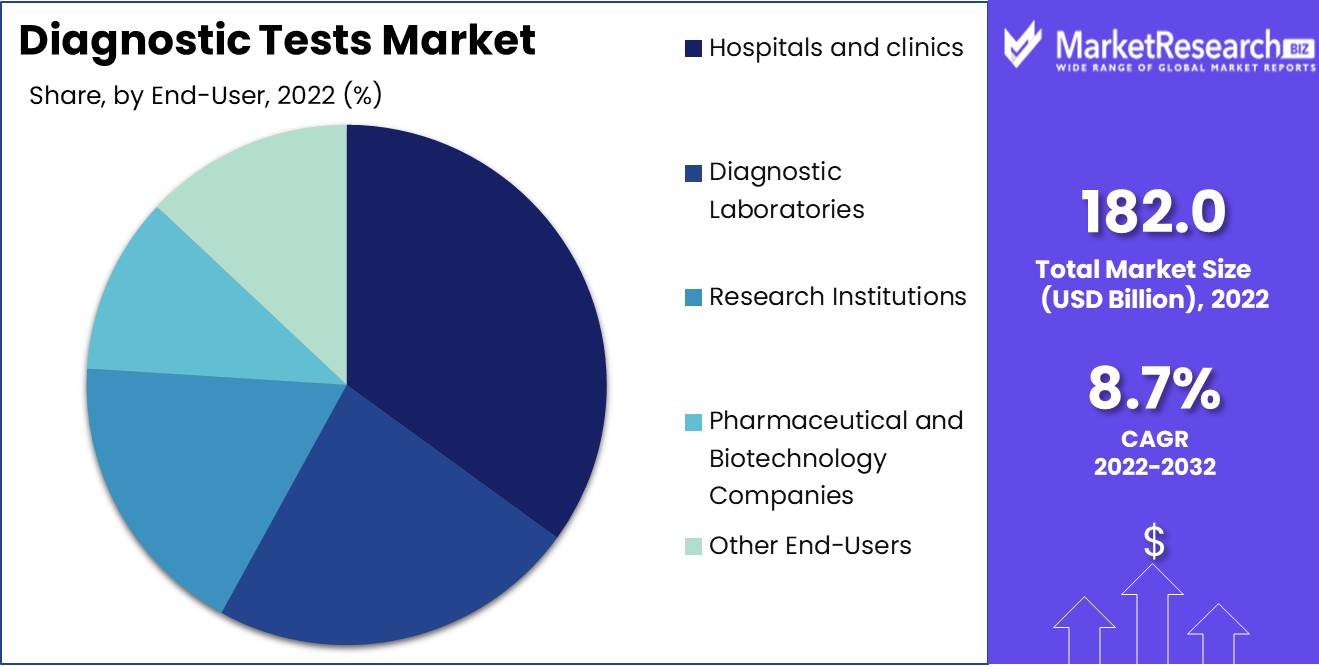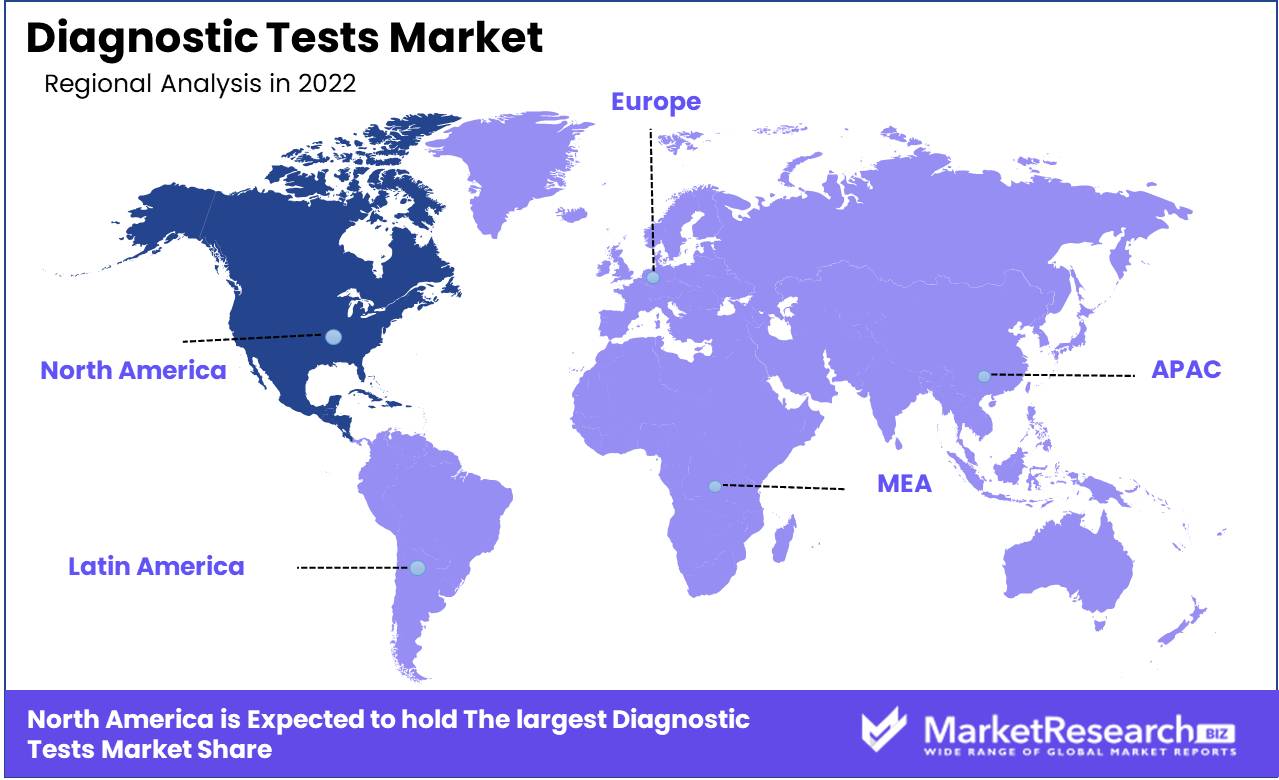
Diagnostic Tests Market By Test (Imaging tests, Laboratory tests, Pathology tests, and Others), By Technology (Immunoassays, Polymerase Chain Reaction (PCR), Microarrays, and Others), By Application (Infectious Diseases , Cancer Diagnostics, and Others),
-
37945
-
June 2023
-
137
-
-
This report was compiled by Correspondence Linkedin | Detailed Market research Methodology Our methodology involves a mix of primary research, including interviews with leading mental health experts, and secondary research from reputable medical journals and databases. View Detailed Methodology Page
-
Report Overview
Diagnostic Tests Market size is expected to be worth around USD 410.5 Bn by 2032 from USD 182.0 Bn in 2022, growing at a CAGR of 8.7% during the forecast period from 2023 to 2032.
The Global Diagnostic Tests Market is a significantly expanding industry that is perpetually innovating and evolving. Diagnostic testing play a crucial role in contemporary medicine, providing vital information that aids in the diagnosis and treatment of diseases and conditions. The report on the Global Diagnostic Tests Market provides a comprehensive analysis of the market, including its size, growth rate, trends, and key participants. Molecular diagnostics, immunoassays, and clinical chemistry are a few of the diagnostic tests covered in this report. It also examines the various applications of diagnostic tests, including the diagnosis of cancer, infectious diseases, and cardiovascular diseases. This report examines regional markets, including North America, Europe, Asia-Pacific, and the Rest of the World.

The Global Diagnostic Tests Market is the market for medical diagnostic tests that aid in the identification of diseases or conditions. The industry is continually innovating and expanding, and it is expanding at an accelerated rate. With the emergence of personalized medicine, there is a greater need for diagnostic tests that provide targeted and accurate diagnoses. Diagnostic procedures are indispensable in modern medicine because they enable medical personnel to make educated choices regarding patient care.
The Global Diagnostic Tests Market is comprised of numerous varieties of diagnostic medical tests that aid in the identification of diseases or health conditions. The purpose of diagnostic tests is to provide accurate, dependable, and timely data that can assist healthcare professionals in making informed decisions regarding patient care. Diagnostic tests are useful for identifying diseases, tracking the effectiveness of treatment, and predicting the likelihood of a disease.
In modern medicine, the Global Diagnostic Tests Market is crucial, as it enables healthcare professionals to make timely and accurate diagnoses. Diagnostic tests can provide valuable information regarding disease onset, progression, and treatment response. In addition, they can assist in identifying genetic susceptibility to disease and customizing treatments for individual patients. Diagnostic tests can help reduce healthcare costs by preventing unnecessary hospitalizations and treatments.
The Global Diagnostic Tests Market is constantly evolving and innovating, as new technologies and products are created to enhance diagnostic accuracy and efficacy. In the diagnostics industry, notable innovations include point-of-care testing, liquid biopsy, and next-generation sequencing. These developments have the potential to revolutionize the diagnosis and treatment of diseases.
Driving factors
Increasing Prevalence of Disease
The global Diagnostic Tests Market is expanding rapidly, predominantly as a result of the increasing prevalence of cancer, diabetes, and cardiovascular diseases. The increasing prevalence of these diseases necessitates quicker and more precise diagnostic tests, resulting in an increase in demand for diagnostic tests and technologies. As the prevalence of these diseases continues to rise, the need for efficient and dependable diagnostic solutions becomes of the utmost importance.
Enhancing Personalized Medicine
Continuous advances in diagnostic technologies play a crucial role in the expansion of the market, allowing for more precise and expedient disease diagnosis. Next-generation sequencing, molecular diagnostics, and digital pathology have revolutionized the field, paving the way for personalized medicine, early disease detection, and individualized treatment. These technological advances have had a substantial impact on Diagnostic Tests Market, augmenting diagnostic capabilities and providing healthcare professionals with invaluable insights.
Enhanced by Infectious Disorders
Demand for accurate and speedy test results, especially in the field of infectious diseases, is a key growth driver for the market. The COVID-19 pandemic has highlighted the importance of rapid and accurate diagnosis, resulting in increased research and development efforts in this field. The emphasis on rapid and accurate testing has stimulated innovation, resulting in the widespread adoption of advanced diagnostic tests and technologies for efficient disease management. In the broader context of the In Vitro Diagnostics market, infectious disease diagnostics hold a pivotal position, ensuring early detection.
Unlocking New Prospects
Emerging technologies, such as artificial intelligence (AI), machine learning, and blockchain, hold enormous potential for Diagnostic Tests Market. AI is making significant advances in medical imaging, allowing for more precise interpretations and enhancing diagnostic efficacy. Blockchain technology assures the secure and transparent exchange of patient information, thereby enhancing data integrity and confidentiality. These revolutionary technologies are transforming the industry, revolutionizing diagnostics, and paving the way for new avenues of innovation.
Managing a Dynamic Competitive Environment
Several prospective disruptors have the ability to alter the competitive landscape of Diagnostic Tests Market. Significantly influencing market dynamics are factors such as technological advancements, pricing pressures, and the introduction of new, innovative competitors. To maintain a competitive edge in this swiftly changing landscape, market participants must remain flexible, foster innovation, and adjust to shifting trends.
Restraining Factors
The Cost Dilemma
The Global Diagnostic Tests Market is hindered by a number of significant restraints, with the high cost of diagnostic tests being the most significant concern. This is primarily attributable to costly apparatus, reagents, and the need for trained personnel to conduct the tests. In addition, laboratories and hospitals frequently mark up prices, adding to patients' financial burden.
For low-income individuals and developing nations, the exorbitant costs associated with diagnostic tests pose a significant obstacle. Especially for global health applications, the demand for inexpensive diagnostic tests is growing. The high cost significantly restricts accessibility and inhibits the expansion of the diagnostic testing market.
Reimbursement Difficulties
Reimbursement issues are an additional barrier to entry for the Global Diagnostic Tests Market. This problem is especially prevalent in nations like the United States, where private insurance companies and government programs like Medicare and Medicaid determine diagnostic test coverage and reimbursement rates.
In addition, the requirement for prior authorization prior to the approval of insurance coverage delays patient access to diagnostic testing. The problem is exacerbated by the fact that many diagnostic procedures are specialized and uncommon, meaning that insurance companies do not cover them or cover them with restrictions.
Understanding the Complexity of Approval Processes
A significant obstacle for the Global Diagnostic Tests Market is regulatory and approval processes. These procedures vary across regions and nations, with stringent regulations in nations such as the United States, where the Food and Drug Administration (FDA) oversees the approval of diagnostic tests.
Particularly for small businesses and entrepreneurs, the FDA approval process can be arduous, time-consuming, and expensive. Complying with FDA regulations often requires companies to form partnerships or make substantial investments in research and development, which increases the difficulty and expense of bringing new diagnostic tests to market.
Alternative Diagnostic Methods as Competition
The Global Diagnostic Tests Market is further restrained by the presence of alternative diagnostic methods. These alternatives, which include point-of-care disease diagnostics testing and non-invasive diagnostic testing, offer immediate results, lower costs, and less invasiveness than conventional diagnostic tests.
The increasing prevalence of these alternative diagnostic methods, especially in low-income nations, poses a challenge for conventional diagnostic testing. The costs and specialized apparatus associated with conventional diagnostic tests frequently make it challenging for these nations to provide adequate healthcare.
Application Analysis
Global Diagnostic Tests Market Segment Dominates Cardiovascular Disorders. In recent years, the global Diagnostic Tests Market has expanded exponentially, with an emphasis on cardiovascular disorders being the primary driver of this growth. It is anticipated that this segment will continue to dominate the market in the future years.
Consumers are becoming increasingly concerned about cardiovascular disorders, resulting in an increase in demand for early detection and monitoring. Consumers have become more health-conscious and are increasingly interested in preventive healthcare. Consumers are more aware of the benefits of early detection and monitoring as a result of the expansion of public awareness campaigns on cardiovascular health. Due to a number of factors, the cardiovascular disorders segment is anticipated to experience the highest growth rate in the coming years. These include significant advancements in medical technology, financial and technological investments in healthcare, and expanding public awareness campaigns.
End-User Analysis
Global Diagnostic Tests Market Segment Dominates Hospitals and Clinics. The majority of diagnostic testing apparatus is utilized by hospitals and clinics. These facilities provide an extensive array of diagnostic services, such as thermal imaging, laboratory testing, and clinical examinations. Clinics and hospitals provide the necessary infrastructure of medical apparatus, trained personnel, and network infrastructure, which facilitates the rapid diagnosis of cardiovascular disorders.
Aware of the significance of healthcare, consumers are increasingly pursuing preventive and diagnostic options. Patients favor hospitals and clinics for diagnostic testing because they offer a variety of diagnostic tests and consultations. Hospitals and clinics are anticipated to experience the highest growth rate in the coming years due to the accelerated development of medical technologies, rising health concerns, and the declining cost of healthcare services. Hospitals and clinics are adopting diagnostic testing services due to the rapid expansion of the healthcare industry and the increase in public and private healthcare organizations.

Key Market Segments
By Test
- Imaging tests
- Laboratory tests
- Pathology tests
- Molecular diagnostics
- Point-of-care tests
- Other Tests
By Technology
- Immunoassays
- Polymerase Chain Reaction (PCR)
- Next-generation sequencing (NGS)
- Microarrays
- Flow Cytometry
- Other Technology
By Application
- Infectious Diseases
- Cancer Diagnostics
- Cardiovascular Disorders
- Neurological Disorders
- Autoimmune Diseases
- Genetic Disorders
- Pregnancy Testing
- Other Applications
By End-User
- Hospitals and clinics
- Diagnostic Laboratories
- Research Institutions
- Pharmaceutical and Biotechnology Companies
- Other End-Users
Growth Opportunity
Transforming Disease Detection
The creation of innovative and advanced diagnostic tests for various diseases is a significant market growth driver. Technological advances and scientific discoveries have enabled the development of tests capable of detecting complex conditions such as cancer, infectious diseases, and genetic disorders that are highly accurate and reliable. These diagnostic tests not only facilitate the early detection of disease, but also contribute to improved health outcomes, decreased healthcare costs, and enhanced patient well-being.
Attempting to Meet Unmet Diagnostic Needs
The expansion into emerging markets with unmet diagnostic requirements is also a significant factor propelling the global diagnostic tests market. Due to limited access to quality healthcare services, emerging markets have an increasing demand for high-quality diagnostic tests as the global population grows and ages. Rapid economic growth and development in regions such as Asia, Africa, and Latin America provide opportunities for market expansion, bridging the deficit in healthcare and diagnostic testing services.
Digital Diagnostics and Point-of-Care Testing
Point-of-care (POC) testing and digital diagnostics are revolutionizing the global market for diagnostic assays. POC testing enables the analysis of patient samples at the site of care, be it a clinic, doctor's office, or even a patient's residence, delivering faster results and facilitating immediate decision making. Using technologies such as artificial intelligence (AI), machine learning (ML), and cloud computing, digital diagnostics improve the analysis and interpretation of patient data, thereby accelerating the diagnostic procedure. The adoption of these technologies has considerably improved the speed, precision, and convenience of diagnostic testing, opening the door to quicker and more precise diagnoses and treatment strategies.
Collaborations between Healthcare Providers and Manufacturers
Collaborations between diagnostic test manufacturers and healthcare providers are crucial to the expansion of the global Diagnostic Tests Market. As the demand for high-quality diagnostic tests continues to increase, manufacturers and healthcare providers are collaborating to develop and distribute innovative diagnostic tests that meet the evolving requirements of patients and healthcare professionals. These collaborations facilitate the development of highly specialized diagnostic tests for infectious diseases, cancer, and genetic disorders, among others.
Latest Trends
Modifying the Diagnostic Tests Market
The global Diagnostic Tests Market is enduring a profound transformation as a result of a number of key market trends that are reshaping the industry. Integration of artificial intelligence (AI), the use of biomarkers and genetic testing, and the rise of swift and near-patient testing are transforming the landscape of conventional diagnostics. In the years to come, it is anticipated that these trends will fuel significant growth in the global market.
Precision and Early Detection Unleashed
Molecular diagnostics is a prominent market trend that has revolutionized disease diagnosis. By detecting and analyzing genetic material, molecular diagnostic tests provide highly accurate and sensitive results, frequently detecting infections prior to the onset of clinical symptoms. This facilitates early diagnosis and prompt treatment, thereby preventing disease progression. Molecular diagnostics provide healthcare professionals with precision insights into an individual's genetic composition, allowing for the development of personalized and targeted treatments.
Rapid and Patient-Near Testing
Rapid and near-patient testing is rapidly acquiring popularity on the global Diagnostic Tests Market. Rapid diagnostic tests provide accurate and timely results without requiring extensive laboratory procedures. They can be performed at the patient's bedside or in the doctor's office, delivering immediate results and allowing for prompt decisions. Near-patient testing increases efficacy by allowing healthcare providers to conduct tests on-site, thereby eradicating the need for off-site laboratory processing. These innovations save time, especially in emergency situations, and reduce the costs associated with transporting samples.
Utilization of Genetic Testing and Biomarkers
Biomarkers and genetic testing are revolutionizing the diagnosis and treatment of disease. Indicators of maladies, infections, or biological processes, biomarkers are quantifiable molecules. They aid healthcare providers in disease diagnosis, treatment selection, and disease monitoring by providing valuable information. In contrast, genetic testing investigates alterations or mutations in an individual's genes or chromosomes to determine their susceptibility to specific diseases. These diagnostic instruments provide individualized insights, allowing for targeted treatments and interventions.
Enhancing Diagnostic Determination
Integrating artificial intelligence (AI) is a key trend that has a substantial impact on the global diagnostic tests market. AI is capable of analyzing immense quantities of medical data, such as medical images and electronic health records, and providing precise diagnostic insights. AI improves patient outcomes, decreases costs, and boosts overall efficiency by assisting healthcare providers in making informed decisions. AI-powered diagnostic solutions have the potential to revolutionize the field, altering the way in which diseases are identified and treated.
Regional Analysis
The Diagnostic Tests Market is Dominate by North America. Diagnostic Tests Market is one of the fastest-growing in the healthcare industry, as technological advancements and increased accessibility have led to an increase in demand for diagnostic tests. In recent years, North America has come to dominate the market for diagnostic examinations. This article will discuss the causes for North America's dominance and the future of Diagnostic Tests Market.
Several factors contribute to North America's dominance in the market for diagnostic examinations. First, North America is home to some of the world's most prominent healthcare companies, such as Abbott Laboratories, Thermo Fisher Scientific, and Quest Diagnostics. These businesses have made substantial investments in research and development to produce innovative diagnostic tests that are highly accurate and efficient.
The healthcare system in North America is highly developed, with high levels of healthcare spending and insurance coverage. This has increased the availability and affordability of diagnostic tests, leading to an increase in demand for these services.
In North America, there has been a growing emphasis on preventative healthcare, with providers emphasizing early disease detection and diagnosis. This has led to an increase in the utilization of diagnostic tests, which has contributed to the market's expansion.
There are several trends that are likely to influence the future of Diagnostic Tests Market. First, the demand for personalized medicine is increasing, necessitating diagnostic tests that can identify specific genetic markers and tailor treatments accordingly. This is likely to result in increased investment in the research and development of more sophisticated diagnostic tests.

Key Regions and Countries
North America
- US
- Canada
- Mexico
Western Europe
- Germany
- France
- The UK
- Spain
- Italy
- Portugal
- Ireland
- Austria
- Switzerland
- Benelux
- Nordic
- Rest of Western Europe
Eastern Europe
- Russia
- Poland
- The Czech Republic
- Greece
- Rest of Eastern Europe
APAC
- China
- Japan
- South Korea
- India
- Australia & New Zealand
- Indonesia
- Malaysia
- Philippines
- Singapore
- Thailand
- Vietnam
- Rest of APAC
Latin America
- Brazil
- Colombia
- Chile
- Argentina
- Costa Rica
- Rest of Latin America
Middle East & Africa
- Algeria
- Egypt
- Israel
- Kuwait
- Nigeria
- Saudi Arabia
- South Africa
- Turkey
- United Arab Emirates
- Rest of MEA
Key Players Analysis
The global Diagnostic Tests Market is highly competitive, with only a handful of companies dominating the industry. F. Hoffmann-La Roche Ltd, Abbott Laboratories, Siemens Healthineers AG, Danaher Corporation, Thermo Fisher Scientific, and Becton, Dickinson and Company are among these companies.
The Swiss multinational healthcare corporation F. Hoffmann-La Roche Ltd develops, manufactures, and markets diagnostic assays and systems for clinical research, pathology, and infectious diseases. The diagnostics division of the company offers an extensive selection of innovative products, such as blood glucose meters, coagulation monitors, and molecular diagnostic tests.
Abbott Laboratories is a healthcare organization situated in the United States that develops, manufactures, and markets medical devices, nutrition, and diagnostics. Its diagnostics division offers, among other things, products for infectious diseases, blood screening, and cancer diagnostics.
Siemens Healthineers AG is a German multinational provider of imaging diagnostics, laboratory diagnostics, and medical IT solutions. The diagnostics division of the company is one of the world's foremost providers of in-vitro diagnostic solutions for clinical laboratories.
The United States-based Danaher Corporation operates in four business segments: life sciences, diagnostics, dental, and environmental and applied solutions. The diagnostics segment provides clinical laboratories with a variety of products and solutions, including diagnostic instruments, reagents, and software.
Thermo Fisher Scientific is a biotechnology corporation headquartered in the United States that provides a variety of products and services for life sciences research, clinical diagnostics, and pharmaceutical development. Its diagnostics division includes, among others, diagnostics for autoimmune diseases, infectious diseases, and cancer.
Becton, Dickinson and corporation is a medical technology corporation situated in the United States that designs and manufactures medical devices, laboratory equipment, and diagnostic products. Its diagnostic segment includes, among others, products for diagnosing infectious diseases, women's health, and cancer.
Top Key Players in Diagnostic Tests Market
- Bio-Rad Laboratories
- Danaher Corporation
- F. Hoffmann-La Roche AG
- Abbott Laboratories
- BioMérieux
- Qiagen
- Quest Diagnostics
- Siemens Healthineers
- Sysmex Corporation
- Thermo Fisher Scientific
- Other Key Players
Recent Development
- In 2022, Abbott Laboratories launched a new rapid test for COVID-19 that can provide results in as little as 15 minutes. The test is designed to be used at home or in a healthcare setting and is expected to be available in the United States in the coming months.
- In 2022, Roche Diagnostics launched a new blood test that can detect cancer up to 10 years before symptoms appear. The test is still in the early stages of development, but it has the potential to revolutionize cancer screening and early detection.
- In 2022, Illumina Inc. announced that it had acquired Grail Inc., a company developing a blood test for early-stage cancer detection. The acquisition is expected to accelerate the development of Grail's test and make it available to patients sooner.
- In 2022, Verily Life Sciences announced that it had partnered with the University of California, San Francisco, to develop a new blood test for Alzheimer's disease. The test is still in the early stages of development, but it has the potential to provide a new way to diagnose Alzheimer's disease and track its progression.
Report Scope:
Report Features Description Market Value (2022) USD 182.0 Bn Forecast Revenue (2032) USD 410.5 Bn CAGR (2023-2032) 8.7% Base Year for Estimation 2022 Historic Period 2016-2022 Forecast Period 2023-2032 Report Coverage Revenue Forecast, Market Dynamics, COVID-19 Impact, Competitive Landscape, Recent Developments Segments Covered By Test (Imaging tests , Laboratory tests , Pathology tests , Molecular diagnostics , Point-of-care tests, Other Tests)
By Technology (Immunoassays, Polymerase Chain Reaction (PCR), Next-generation sequencing (NGS), Microarrays, Flow Cytometry, Other Technology)
By Application (Infectious Diseases , Cancer Diagnostics, Cardiovascular Disorders, Neurological Disorders, Autoimmune Diseases, Genetic Disorders, Pregnancy Testing, Other Applications)
By End-User (Hospitals and clinics, Diagnostic Laboratories, Research Institutions, Pharmaceutical and Biotechnology Companies, Other End-Users)Regional Analysis North America – The US, Canada, & Mexico; Western Europe – Germany, France, The UK, Spain, Italy, Portugal, Ireland, Austria, Switzerland, Benelux, Nordic, & Rest of Western Europe; Eastern Europe – Russia, Poland, The Czech Republic, Greece, & Rest of Eastern Europe; APAC – China, Japan, South Korea, India, Australia & New Zealand, Indonesia, Malaysia, Philippines, Singapore, Thailand, Vietnam, & Rest of APAC; Latin America – Brazil, Colombia, Chile, Argentina, Costa Rica, & Rest of Latin America; Middle East & Africa – Algeria, Egypt, Israel, Kuwait, Nigeria, Saudi Arabia, South Africa, Turkey, United Arab Emirates, & Rest of MEA Competitive Landscape Bio-Rad Laboratories, Danaher Corporation, F. Hoffmann-La Roche AG, Abbott Laboratories, BioMérieux, Qiagen, Quest Diagnostics, Siemens Healthineers, Sysmex Corporation, Thermo Fisher Scientific, Other Key Players Customization Scope Customization for segments, region/country-level will be provided. Moreover, additional customization can be done based on the requirements. Purchase Options We have three licenses to opt for: Single User License, Multi-User License (Up to 5 Users), Corporate Use License (Unlimited User and Printable PDF) -
-
- Bio-Rad Laboratories
- Danaher Corporation
- F. Hoffmann-La Roche AG
- Abbott Laboratories
- BioMérieux
- Qiagen
- Quest Diagnostics
- Siemens Healthineers
- Sysmex Corporation
- Thermo Fisher Scientific
- Other Key Players




